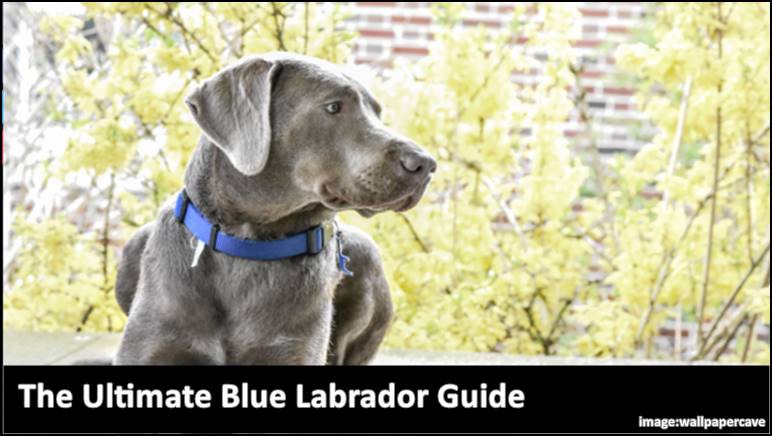Are you looking for a loyal companion that will be your best friend for life? If so, then a Blue Labrador Retriever might be the perfect choice for you. This Labrador breed is also knows as Silver Labrador. Not only are these pups extremely loyal and loving, but they are highly intelligent and easily trainable too. 🦮
They are known for their beautiful coats, which come in several shades of blue. But before you decide if a Blue Labrador Retriever is right for you, it’s important to read and know about all the information related to a Blue Labrador Retriever.
Blue Labrador Retriever Breed Info
The Blue Labrador Retriever is a popular breed of dog, and that for a good reason. This breed is known for its loyalty, intelligence, and beautiful blue (silver) coat. The Breed is a medium-sized dog that typically weighs between 55 to 80 pounds.
They are an active breed that requires regular exercise and stimulation, so they are an ideal choice for an active dog loving family. And if you are interested in knowing whether a blue lab is a purebred or not, you can go through our informative article here.
The Blue Lab Retriever is an incredibly loyal and loving breed of dog. They are devoted to their families and will be your best friend for life. They are highly intelligent, so they are very easy to train and are great for first-time dog owners. They are also known for their calm and gentle nature, making them a great choice for families with children.
👍 Pros of Owning a Blue Labrador Retriever
There are many great benefits to owning a Blue Labrador Retriever. First and foremost, they are incredibly loyal and loving. They will quickly become a part of the family and will do anything to protect their loved ones.
They are also very intelligent and easily trainable, so they are great for first-time dog owners. Another great benefit is that they are relatively low maintenance in terms of grooming and exercise requirements.
The canine breed possesses a silver fur with a hint of blue color. They have a thick coat that keeps them warm in cold weather. This breed is known to be very healthy and rarely suffers from any major health issues. They are known for their even temperaments, making them great family dogs.
👎 Cons of Owning a Blue Labrador Retriever
As with any breed of dog, there are also some drawbacks to owning a Blue Labrador Retriever. Usually, Labradors shed twice a year, and they are also susceptible to seasonal shedding. This means that owners must stay on top of their dog’s grooming routine in order to keep the shedding under control.
Regular brushing using the right tools and techniques can help remove loose fur and reduce the amount of shedding. Additionally, shampooing regularly and using a de-shedding shampoo can help to reduce the amount of fur that is shed.
This breed comes with a lot of energy and that means they need to expend it in order to stay healthy and fit. Without proper activity and exercise, obesity could become a problem. Therefore, it is important to provide your dog with the necessary activity to keep them healthy and in shape. This could include taking them for daily walks, playing games with them, or enrolling them in a canine sport.
Feed your dog properly to ensure they are getting the nutrition they need without over-feeding them. Feeding them the recommended amount of food for their breed and size is key. Treats should also be limited and used sparingly to avoid overfeeding.
How to Take Care of a Blue Labrador Puppy
Silver or Blue Labrador puppies, require physical and mental stimulation in order to prevent anxiety and negative behavior. If socialized early, they will enjoy interacting with the all the family members and other pets as well.
Exercising for approximately one hour daily is essential for a Blue Labrador, It can also include 2 hours walks or other physical activities. Regular training sessions should be done, particularly when the dog is young.
Blue Labrador Training
Training a Labrador is relatively easy due to its intelligence. However, it is required to start training your pup as early as possible. This will help them learn basic obedience commands, such as sit, stay, and come. It is also significant to teach them socialization skills, as this will help them interact with other dogs and people in a positive way.
Positive reinforcement is the best way to train your pup. This means rewarding them with treats and praise when they do something correctly. It is also important to be consistent with your training, as this will help your pup learn faster. Finally, it is very necessary to be patient with your pup and never use physical punishment, as this can lead to behavioral issues.
Related:
The Benefits of Operant Conditioning in Labrador Training
Blue Labrador Exercise
Labrador Retrievers are very active dogs and require plenty of exercise and stimulation. This breed is known for its love of running and playing, so it is a good idea to provide them with plenty of opportunities to do so. Taking your pup on a daily walk or run is a great way to keep them active and healthy.
This breed also enjoys playing games such as fetch and tug-of-war. This type of exercise is great for their minds and will help them to stay stimulated. It is also important to provide your pup with plenty of mental stimulation, as this will help them to stay focused and engaged. Puzzle toys, interactive toys, and hide-and-seek games are all great ways to keep your pup’s mind active.
Blue Labrador Health Issues
While Blue Labradors are generally healthy dogs, they can be prone to certain health issues. Some of the most common health issues for this breed include hip and elbow dysplasia, eye problems, and skin allergies. It is important to be aware of these potential health issues and to take your pup for regular checkups with the vet.
It is also essential to keep your pup at a healthy weight, as this will help to prevent any potential health issues. Providing your pup with a balanced and nutritious diet is the best way to ensure that they stay healthy. It is important to provide them with plenty of exercise, as this will help to keep their joints and muscles healthy.
Blue Labrador Grooming
Labrador Retrievers are relatively low maintenance when it comes to grooming. They have a thick, waterproof coat that requires minimal grooming. It is important to brush your pup’s coat on a regular basis, as this will help to keep it healthy and free of tangles.
It is also important to bathe your pup occasionally, but not too often. Too much bathing can strip the natural oils from their coat and lead to dry skin.
Trim their nails on a regular basis and to check their ears for any signs of infection. Finally, it is important to brush their teeth regularly to prevent any dental problems.
Blue Labrador Temperament
Blue Labrador Retrievers are generally very well-behaved dogs, but they can be prone to certain temperament issues. This breed can be very possessive and protective of their family, so it is important to make sure that they are properly socialized. It is also important to be consistent with your training, as this will help to keep your pup focused and well-behaved.
This breed is also known to be very vocal, so it is important to train them not to bark excessively. It is also important to make sure that they are not left alone for long periods of time, as this can lead to separation anxiety.
Make sure that you are providing your pup with plenty of exercise and stimulation, as this will help to keep them mentally and physically healthy.
The Best Dog Food for Blue Labrador
It is important to provide your Blue Labrador Retriever with a balanced and nutritious diet. This breed is known for their love of food, so you need to make sure that you are providing them with the right nutrients. This breed does best on a diet that is high in protein and low in fat. It is also significant to provide them with plenty of fresh vegetables and fruits.
Blue Labrador Puppy Dog Food
Due to their size and genetic composition, Blue Labs are more likely to suffer from hip and elbow dysplasia due to their size and genetic composition. Therefore, it is recommended to feed blue Labrador puppies a dog food that is higher in calcium. Chicken and fish are also excellent options.
Dog Food for Adult Blue Labrador Retriever
It is essential to keep food secure, as full-grown Silver or Blue Labradors are just as food motivated as their counterparts so its best to keep their food at a secure place. The caloric needs of an adult Blue Labrador Retriever can vary based on their age, weight, activity level, and metabolism, but 1650-2400 calories per day is a typical range for a healthy adult Labrador. which should be split into two separate mealtimes for easier digestion. Do monitor their food intake!
Blue Labrador as a Pet
The Blue Lab Retriever is a remarkably devoted and fond breed of pooch. They are recognized for their magnificent azure fur and their smarts. They are furthermore quite effortless to look after when it comes to grooming and exercise needs. Still, it is essential to ponder the advantages and disadvantages of having a Blue Labrador Retriever before making a determination.
It is also vital to make sure that you are supplying your pup with a balanced and nourishing diet, ample exercise, and frequent teaching. If you take all these elements into account, then a Blue Labrador Retriever could be the ideal accompaniment for you and your family.
Unique Dog Name Ideas for Blue Labradors
Bluebell – a nod to the blue flower
Slate – inspired by the color of slate rock
Cobalt – referencing the blue pigment used in art
Luna – inspired by the moon, which can have a silver hue
Mercury – referencing the silvery-white liquid metal
Ghost – inspired by the ghostly silver appearance of a silver Labrador
Pewter – referencing the alloy of tin, copper, and antimony with a silvery appearance
Ash – referencing the ash grey color associated with silver Labradors


